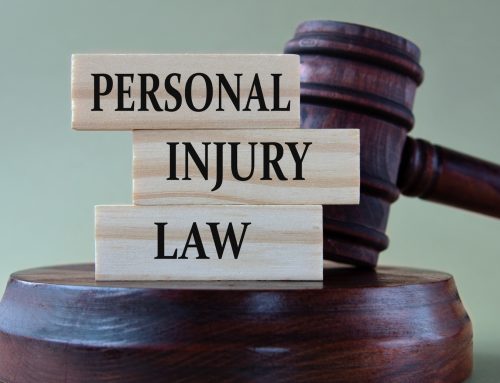Car accidents don’t just cause physical injuries—they can also take a severe emotional toll. Many accident victims experience anxiety, depression, PTSD, and other psychological effects that impact their daily lives. But while physical injuries are often easier to prove, filing a claim for emotional distress can be more complicated.
At Reid Law Group, we know that emotional suffering is just as real as physical pain, and we fight to ensure our clients receive full compensation for all their damages—both seen and unseen. In this blog, we’ll explain what emotional distress is, how it applies in personal injury claims, and what steps you need to take to build a strong case.
- What Is Emotional Distress in a Car Accident Claim?
Emotional distress refers to the psychological impact an accident has on a victim. This can include:
- Anxiety & Panic Attacks – Fear of driving or being in a vehicle, hypervigilance, or excessive worry.
- Post-Traumatic Stress Disorder (PTSD) – Flashbacks, nightmares, and avoidance behaviors following a severe accident.
- Depression – Persistent sadness, hopelessness, or withdrawal from loved ones.
- Sleep Disturbances – Insomnia, nightmares, or difficulty falling asleep due to accident-related trauma.
- Cognitive Issues – Difficulty concentrating, memory problems, or trouble processing emotions.
- Loss of Enjoyment of Life – No longer being able to engage in activities or social interactions as before.
Unlike physical injuries, emotional distress is invisible, making it more challenging to prove. That’s why having a personal injury attorney on your side is critical. At Reid Law Group, we know how to build strong emotional distress claims that stand up to scrutiny.
- Can You File a Claim for Emotional Distress in Georgia?
Yes. In Georgia, accident victims can seek non-economic damages, which include emotional distress, mental anguish, and loss of enjoyment of life. However, these claims require strong evidence to prove the extent of emotional suffering.
Georgia law allows emotional distress claims in two ways:
- As Part of a Personal Injury Claim: If you suffered physical injuries, you could include emotional distress damages in your overall personal injury claim.
- The more severe your injuries, the more likely emotional distress will be recognized.
- As a Standalone Claim for Negligent or Intentional Infliction of Emotional Distress: If you were in an accident but didn’t suffer physical injuries, you may still be able to file a claim under certain circumstances.
- Courts in Georgia typically require significant emotional distress, such as PTSD from witnessing a particularly traumatic accident.
At Reid Law Group, we evaluate the specific details of your case to determine the best legal path for recovering emotional distress damages.
- How to Prove Emotional Distress in a Car Accident Case
Because emotional injuries aren’t visible, evidence is key. Here’s how we help clients build a compelling case:
- Medical and Psychological Records
- Therapy or Counseling Notes – Documenting your sessions with licensed mental health professional helps validate your claim.
- Doctor Diagnoses – Anxiety, PTSD, or depression diagnoses strengthen your case.
- Medication Prescriptions – If you’ve been prescribed antidepressants, anti-anxiety medication, or sleep aids, it proves the seriousness of your condition.
- Testimony from Mental Health Experts
- Expert psychologists or psychiatrists can provide professional opinions on how the accident has impacted your mental health.
- Personal Testimony and Witness Statements
- Your Own Statement – A detailed journal or written account describing your emotional struggles.
- Statements from Family & Friends – They can testify to changes in your behavior, mood, or ability to function after the accident.
- Evidence of Lifestyle Changes
- If you’ve had trouble returning to work, socializing, or enjoying hobbies, this can support your claim for emotional distress.
At Reid Law Group, we work closely with doctors, therapists, and expert witnesses to document emotional injuries and secure the compensation you deserve.
- Challenges in Filing an Emotional Distress Claim
While Georgia law allows emotional distress claims, insurance companies often push back. Here are some common challenges:
- Insurance Companies Downplay Mental Suffering
- Adjusters may argue that emotional distress is not serious enough to warrant compensation.
- They may claim that psychological symptoms are pre-existing or unrelated to the accident.
- Lack of Immediate Medical Treatment
- If you didn’t seek therapy or counseling right away, the insurance company may claim your distress is exaggerated or unrelated to the accident.
- Difficulty in Proving Emotional Suffering
- Unlike physical injuries, mental trauma doesn’t show up on X-rays or scans, making it harder to quantify.
- What Compensation Can You Receive for Emotional Distress?
If emotional distress is part of your personal injury claim, your settlement may include:
- Medical Expenses – Therapy, counseling, and psychiatric treatment costs.
- Lost Wages – If your distress prevents you from working.
- Pain and Suffering – Compensation for mental anguish, PTSD, anxiety, and depression.
- Loss of Enjoyment of Life – If emotional distress has significantly impacted your quality of life.
While every case is different, Reid Law Group fights for the maximum compensation possible.
- Steps to Take If You Are Experiencing Emotional Distress After an Accident
If you believe you are suffering from emotional distress after a car accident, follow these steps to protect your claim:
- Seek Medical Help Immediately
- Visit a doctor, therapist, or psychiatrist to document your symptoms.
- The sooner you seek treatment, the stronger your case will be.
- Keep a Journal
- Record your thoughts, feelings, and struggles daily.
- Note nightmares, panic attacks, or any changes in mood or behavior.
- Speak to an Attorney
- DO NOT accept a settlement before consulting an experienced attorney.
- At Reid Law Group, we offer free consultations to assess your case and determine your best legal options.
Emotional distress is real and compensable under Georgia law, but proving it requires strong evidence and experienced legal representation. If you’ve suffered psychological trauma after a car accident, don’t let insurance companies dismiss your suffering.
Let Reid Law Group fight for the justice and compensation you deserve. Call today for a free consultation and take the first step toward recovery.







